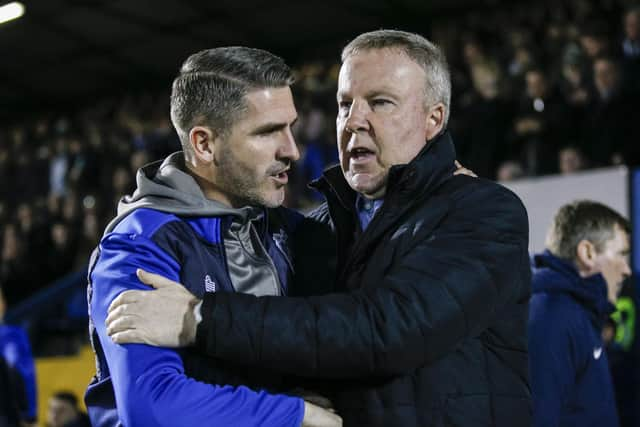The views of Plymouth, Charlton and ex-Fleetwood bosses and the 'moneybags' Portsmouth myth
and live on Freeview channel 276
But the comments still led to some observers checking their calendars, considering whether it was 2016 all over again and asking if Derek Adams was still at the helm at Home Park.
‘They are way above our budgets and everything else – and blow everyone out the water,’ said Plymouth boss Ryan Lowe earlier this month, a whole two days after last referencing Pompey’s spending power ahead of his side’s trip to Fratton Park.
Advertisement
Hide AdAdvertisement
Hide AdAmid some complimentary pre-match words towards their opponents, the sub-text was clear: we’re facing a team operating with a financial bias.
It wasn’t quite Paul Cook v Adams and their infamous exchanges of recent years, as the rivalry between their clubs was ramped up back then.
Not that it was particularly the case in this instance, but any manager looking for a nibble from Kenny Jackett was wasting their time. As the past four years have shown.
But Lowe’s words resonated sufficiently to have been picked up by the Pompey boss, who was primed to detail exact spending levels when recently asked about the comments, in the kind of step he rarely takes.
Advertisement
Hide AdAdvertisement
Hide Ad

‘There has been money spent - we spent around and about £75,000,’ Jackett said, referencing the money paid to bring Callum Johnson in from Accrington.
That spending covers six arrivals last summer and four January deals for Pompey. Not tsunami bomb stuff then.
Jackett went on to outline when analysing fees paid over a longer period, you would need to do so through the prism of net spending. It’s a viewpoint meriting greater scrutiny
Pompey’s most recent accounts show spending of £940,078 on six players, most notably Ellis Harrison. But that figure was more than offset by player sales, sell-on clauses and cup runs as the club announced a £2m profit.
Advertisement
Hide AdAdvertisement
Hide AdThose accounts don’t factor in sizeable fees believed to be around the £1m mark for Marcus Harness and John Marquis, but nor Jamal Lowe’s £2.5m exit to Wigan.
So to suggest Pompey’s budget and ‘everything else leaves the rest of League One behind, as Lowe put it presumably suggesting transfer fees, is completely misleading.
Then we move into the realm of the budgets Lowe references.
The obvious port of call here was the small matter of the £2.5m ceiling all League One sides had been operating under since last summer, before last week’s landmark ruling which saw the wage cap and squad restrictions scrapped.
Pompey haven’t been cited for ignoring those rules yet, so it’s fair to suggest the expenditure since the cap has been in force has not been dissimilar to Plymouth or, say, Charlton or Fleetwood, whose managers have been among those to reference the Blues’ spending power in the past.
Advertisement
Hide AdAdvertisement
Hide AdBefore the wage cap was enforced, Pompey’s playing budget was somewhere between £4m and £4.5m.
The perceived wisdom was that figure placed the Blues in and around the top six budgets at League One level.
Taking clubs’ overall wage bills as an indicator, with player wages clearly the greatest contributor, that suggestion is reinforced.
Pompey were ranked fifth in League One when assessing the most readily available accounts for the 2018-19 season. That with seven sides publishing abbreviated accounts which didn’t release those figures.
Advertisement
Hide AdAdvertisement
Hide AdWith the latest accounts expected in the coming weeks further analysis of the status quo can be expected moving forward, but there is ample evidence here to make an informed judgment on whether Pompey are really worthy of the ‘moneybags’ tag afforded by some.
The presence of a billionaire owner does much to perpetuate the club’s reputation as spenders.
Yet, those close to the Blues narrative know it’s well established the Eisners arrived on a ticket of sustainability. Perhaps that message hasn’t permeated the rest of the football community quite yet.
Of course, Jackett’s even-handedness and sense of perspective allowed him to get to the heart of the issue in a way many of his peers would be unable to.
Advertisement
Hide AdAdvertisement
Hide Ad‘I don’t know where Plymouth’s finances are necessarily,’ he said of Lowe’s views. ‘But generally any manager is angling it from their own situation.’
And that’s what we’re seeing here. Lowe is working to his own constraints and possibly misconceptions which tend to weigh heavily on most managers from time to time. The same could be said of Lee Bowyer, Joey Barton or any other of the steady flow of figures from within the game who reference Pompey’s perceived financial muscle.
But even in the moments when casting an envious glance or frustrations mount, perhaps a better handle on the facts of the matter would be prudent.
A message from the editor
Thank you for reading this story. The dramatic events of 2020 are having a major impact on our advertisers and thus our revenues.
Advertisement
Hide AdAdvertisement
Hide AdThe News is more reliant than ever on you taking out a digital subscription to support our journalism. You can subscribe here for unlimited access to Portsmouth news and information online.
Every subscription helps us continue providing trusted, local journalism and campaign on your behalf for our city.